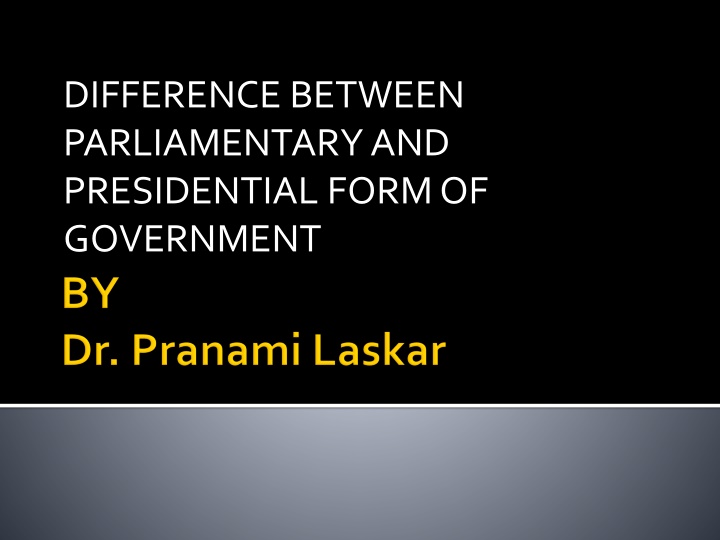
Comparison of Parliamentary and Presidential Forms of Government
Understanding the key differences between parliamentary and presidential forms of government, including aspects like the separation of powers, roles of the lower house, leadership, stability, decision-making processes, and potential drawbacks such as dictatorship tendencies or lack of flexibility.
Download Presentation

Please find below an Image/Link to download the presentation.
The content on the website is provided AS IS for your information and personal use only. It may not be sold, licensed, or shared on other websites without obtaining consent from the author. If you encounter any issues during the download, it is possible that the publisher has removed the file from their server.
You are allowed to download the files provided on this website for personal or commercial use, subject to the condition that they are used lawfully. All files are the property of their respective owners.
The content on the website is provided AS IS for your information and personal use only. It may not be sold, licensed, or shared on other websites without obtaining consent from the author.
E N D
Presentation Transcript
DIFFERENCE BETWEEN PARLIAMENTARY AND PRESIDENTIAL FORM OF GOVERNMENT
Existence of a Titular or Constitution Absence of separation of powers Main role of the lower house in ministry formation Responsibility to the legislature Collective responsibility Intimate relationship between the legislature and the executive Leadership of the Prime Minister Existence of the strong opposition
It ensures stable government Suitable for emergencies Leads to efficiency in the administration Less influence of parties Based on theory of separation of powers Suitable for multi party systems
Harmony between Executive and Legislature Responsible and clean People s government Quick decision making Flexible Conducive to national integration Educational value
Weak separation of powers Cabinet dictatorship Failure to take prompt decision Partisanship Government by Amateurs Control by bureaucracy
Quick and decisiveness in decision making Presidential direction in appointments A single countrywide constituency Merits of separation of powers and checks and balances Fixed tenure of office Individual ministerial responsibility Insulation from party politics
Prone to dictatorship Friction among government organs Lack of flexibility in tenure of office Very expensive to operate Absence of party discipline The process of lobbying can encourage corruption
